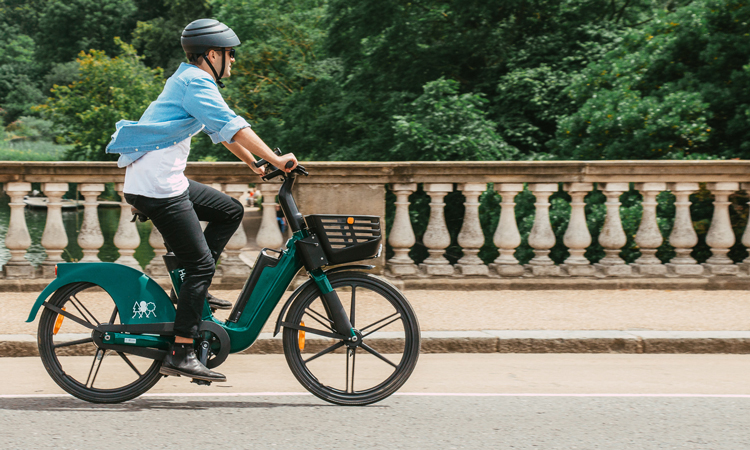Pedalling towards a greener future: Why now is the time for innovation
- Like
- Digg
- Del
- Tumblr
- VKontakte
- Buffer
- Love This
- Odnoklassniki
- Meneame
- Blogger
- Amazon
- Yahoo Mail
- Gmail
- AOL
- Newsvine
- HackerNews
- Evernote
- MySpace
- Mail.ru
- Viadeo
- Line
- Comments
- Yummly
- SMS
- Viber
- Telegram
- Subscribe
- Skype
- Facebook Messenger
- Kakao
- LiveJournal
- Yammer
- Edgar
- Fintel
- Mix
- Instapaper
- Copy Link
Posted: 5 January 2022 | Agustin Guilisasti - HumanForest | No comments yet
Agustin Guilisasti, CEO and Founder of HumanForest, explains why his company’s approach to bikesharing could be the solution that big cities need to make their transport networks more sustainable.


In August 2021, the Intergovernmental Panel on Climate Change (IPCC) released a stark report which made it clear that climate change is widespread, rapid and intensifying. The internationally-accepted authority on climate change was clear that there is no time for delay and no room for excuses. Readers of Intelligent Transport will have long recognised the need to move towards greener forms of transport, but the IPCC’s report reminds us of the need to move rapidly. The benefits of bold and ambitious action to tackle transport emissions can improve people’s health, create better places to live and travel in and drive clean economic growth.
The scale of the problem
In the UK, transport is now the largest contributor to domestic greenhouse gas (GHG) emissions, contributing 28 per cent of UK domestic emissions in 2018. Those moving around our cities increasingly want a system that gets them from A to B safely and securely without damaging the environment. Polling conducted on behalf of the All Party Parliamentary Group on a Green New Deal in 2020 saw fewer than one in seven people want money spent on more or bigger roads. According to the polling, three times as many support investments in cycle networks and local buses. Governments, local authorities and businesses now have a race on their hands to radically and rapidly reduce the strain on the planet that simply getting around causes.
In the UK’s cities, measures to reallocate road space and pricing schemes – like London’s Congestion Charge and Birmingham’s Clean Air Zone – as well as continued investment in public transport, shared mobility and micro-mobility, will all help to support a much-needed shift away from private car use. Given the urgency of the situation, we need to do all of the above, with a focus on ensuring both access and affordability.
Bikes to the rescue?
We already know that cycling causes virtually no environmental damage and promotes health through physical activity. Research published in the British Medical Journal reported that cycling to work is not only linked with a 45 per cent lower risk of developing cancer, but also a 46 per cent lower risk of cardiovascular disease when compared to commuting by car or public transport. As academics John Pucher and Ralph Buehler put it: “Cycling is probably the most sustainable urban transport mode” . Clearly, then, cycling has a major role to play in our response to IPCC’s startling warnings.
However, cycling isn’t always accessible, given upfront costs and people’s preconceived notions. Accessibility is not simply a transport issue: it shapes the opportunities and choices that people have in connecting with jobs, services and friends and families.
With my background in ridesharing from my time at Cabify, I understand the significant impact that innovation in transport can have for opening up urban mobility to far more people. The sharing economy has transformed transportation – apps like Uber and Cabify have made car ownership practically redundant in many of the world’s metropolises. However, to create the clean, green cities of the future, many more of us will have to get out of cars and onto bicycles.
This is what led me to launch HumanForest, a UK‑based electric bike rental platform. By focusing on innovation, we are leading a micro‑mobility revolution that makes cycling even more accessible and affordable. E-bikes are more user-friendly than traditional bikes; we know that cycling can often seem intimidating for infrequent and older riders or those who need to make longer journeys. Electrical assistance can give these riders the push that they need to switch to cycling, contributing to the kind of modal shift that we need to see.
Affordability is also key. E-bike ownership can be prohibitively expensive for many. The UK lags considerably behind its European neighbours when it comes to e-bike ownership, where 40 to 60 per cent of bicycles sold are electric, compared to five per cent in the UK. With this in mind, we’re offering 10 minutes of free riding on our shared e-bikes to everyone, every day. This model means that even the most sceptical are able to try cycling without any commitment.
A sustainable approach
With the IPCC’s findings ringing in our ears, we’ve put tackling climate change at the very heart of our approach. All of the batteries that help our riders to go further and make more journeys possible are powered by certified renewable energy. We’ve also worked to ensure that HumanForest is a completely zero emissions operation, with the vehicles that service our bicycles also being fully electric.
For every mile ridden on a HumanForest e-bike, a rider saves 112 grams of CO2 from being emitted to the atmosphere. We forecast our average ride to be 2.2 miles, which means that, across just 750 bikes, using e-bikes could save up to 40 tonnes of CO2 per month.
Even when it comes to advertising, we’ve also been clear that our partners must be brands that align with our sustainable values. We recently announced an advertising partnership with Nutmeg, which will see the digital wealth manager showcasing its socially responsible investing portfolios through our platform and thereby supporting many journeys.
Of course, ours is just one approach to making transport more sustainable, but I hope that cities around the world ensure that they create a framework that allows operators like us the ability to provide solutions. It is through innovation that we’re able to offer new solutions to the challenges that we face. Moving quickly to a more sustainable transport system will require innovation on the part of cities and local authorities, too. Nimble and forward-thinking regulators can help to unlock the enormous potential of shared micro-mobility and thereby play their part in averting the crisis scenarios that the IPCC predicts.
While the IPCC’s findings lay bare the scale of the challenge that we face, I’m confident of the ability of innovators to meet it. Transport represents an opportunity for significant carbon reductions. Those across the sector have their work cut out for them if we’re to grasp that opportunity and reduce the contribution that our industry makes to global emissions. From building cycling infrastructure through to rolling out electric vehicle charging points, there is a huge amount of work to do in a short period of time. I hope that the approach that we have taken that embeds sustainability throughout, from the charging and servicing of our fleet all the way through to those that we choose to partner with, inspires others.
The need to promote greener modes of transport is clear. HumanForest will be playing our part by providing an affordable and accessible zero emission way of getting around. We know what we must do. Now all we have to do is get on and do it.


Related topics
Accessibility, Air Quality, Mobility Services, Multimodality, Passenger Accessibility, Passenger Experience, Sustainable Urban Transport
Related modes
e-bikes
Related organisations
HumanForest
Related people
Agustin Guilisasti








